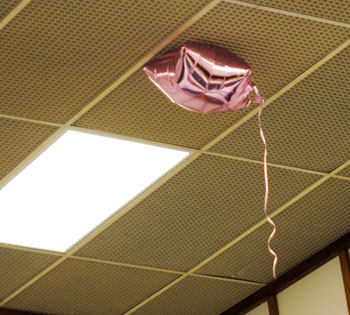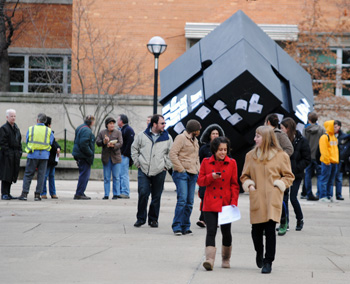Ann Arbor city council meeting (Aug. 15, 2011): One connection among multiple items on the council’s agenda was the era when they originated, back in the mid-2000s.

Ann Arbor city council chambers on Aug. 15, 2011. Despite appearances, the city of Ann Arbor does not currently have a balloon payment due that will put the city up against its debt ceiling. (Photo by the writer).
The city council originally gave its approval to the selection of Village Green as the purchaser of the city-owned First and Washington lot back in 2006. To make up for the fact that the First and Washington deal has not yet been finalized, on Monday the council approved a $3 million inter-fund loan from its pooled investment fund. The money is needed to pay construction bills for the city’s new municipal center.
A year earlier, in 2005, the city received a recommendation from a blue-ribbon task force to change the composition of the board of trustees for its retirement system – to a mix on the board that is less heavily weighted towards members who are beneficiaries of the system. And on Monday, the council approved the Nov. 8 ballot language that will ask voters to change the city charter, which specifies the composition of the board.
A year before that, in 2004, the city council gave direction to city staff to develop an ordinance that would regulate idling vehicles. On Monday, the city council formally received – but took no action on – a resolution from its environmental commission recommending a draft anti-idling ordinance.
Likely dating back even earlier was an agenda item that addresses a point of ongoing friction between the city and the University of Michigan: reimbursement for the costs associated with traffic control during home football games. On Monday, the council approved a resolution that sets Aug. 25 as a deadline for completing a contract that reimburses the city for those costs. Otherwise, the city administrator is directed not to provide the signs and signals operations during home games.
In other business, the council gave final approval to the reapportionment of the five city wards, which will take effect after the Nov. 8 election. The council also set the application fee for medical marijuana business licenses at $600. The city’s medical marijuana licensing legislation, approved in June, takes effect later this month. Mayor John Hieftje also announced nominations for four of the five slots on the newly-established medical marijuana licensing board.
The mayor also announced nominations to the Ann Arbor Downtown Development Authority board. Joan Lowenstein and John Mouat were nominated for reappointment, while Gary Boren, recently elected as chair of the board for the coming year, was not.
At the meeting, the DDA was also highlighted during public commentary by the owner of Jerusalem Garden, a restaurant adjacent to the construction site of the Fifth Avenue underground parking structure, which the DDA is managing. The restaurant has seen revenues drop during construction. He reiterated some of the points he’s made previously when addressing the council and the DDA board, and this time called on the council to think about how to apply lessons learned from the current situation in the future.
Economic development was also part of the council meeting in the form of a resolution the council passed that urges the Washtenaw County board of commissioners to levy a tax to fund economic development. The tax is based on Act 88 of 1913 and does not require voter approval.
The proposed Fuller Road Station maintained a presence during council proceedings in the form of public commentary, as well as a reminder from the council to the mayor that he’d previously indicated a council work session would be scheduled on the project. [Full Story]





